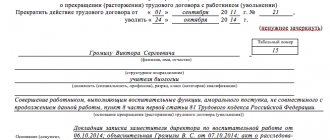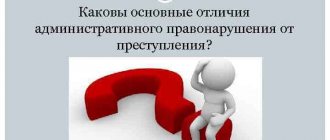In Kemerovo, two friends put the body of their acquaintance in a closet, took it out of town and set it on fire in a ditch near the road. The charred remains were accidentally discovered by one of the drivers passing by. As investigators found out, one of the friends stabbed 28-year-old Sergei Panin with a knife during an argument. The second only helped to hide and destroy the body. The killer was tried under Article 105 and sentenced to 11.5 years in prison. His assistant friend was found guilty of concealing a crime, but got off with a fine - the court ordered him to pay 190 thousand rubles.
Punishment for “concealment of especially serious crimes not promised in advance” is provided for in Article 316 of the Criminal Code. It may result in a fine, forced labor, arrest or imprisonment. The maximum term is two years in prison.
In practice, those who help murderers get rid of a corpse are most often convicted of concealment, but the article also provides for liability for assistance in getting rid of traces of a crime, documents, cars (or providing a car for transporting weapons or a corpse), as well as murder weapons or other especially serious crime.
Thus, in Chelyabinsk, in the spring of 2016, charges under Article 316 were brought against Elena Samsonova and Semyon Labetsky, friends of Edward Krause, who organized the murder of his friend. Born Eduard Shutkin (he changed all his documents to a new name shortly before the crime), according to investigators, he killed his girlfriend with several shots to the head; The woman left behind three small children. Samsonova and Labetsky helped Krause get rid of the corpse, after which the woman gave him a ride to the airport and thus helped him escape, and the man drove the alleged killer’s SUV into the garage.
A 17-year-old teenager from Petropavlovsk-Kamchatsky asked his brother and a friend (both adults) to help bury the body of the man he killed. The young people did not refuse. The criminal was quickly found, and a year after the murder, in 2014, he was sentenced to seven years in prison. The accused spoke not only about his role, but also about the service provided by a relative and acquaintance, and in the summer of 2016 a case was opened against the latter for concealing a murder. The brother of the convicted person does not face liability: “A person is not subject to criminal liability for concealment of a crime committed by his spouse or close relative that was not promised in advance,” says the note to Article 316.
"False sense of camaraderie" and suspended sentences
Every year in Russia, courts pass about 300 sentences under Article 316: in 2015, 238 people were convicted, in 2014 - 254 people, in 2013 - 238, in 2012 - 269, in 2011 - 297, in 2010 - 348, in 2009 - 402 people .
The most frequently used punishment is a fine, usually no more than 100 thousand rubles. In December 2016, a 20-year-old resident of the village of Shulgino, located near Perm, was sentenced to a fine. In May 2016, he saw how his friend stabbed a man on a neighboring property and dragged the body into the house. As stated in the verdict, “out of a false sense of camaraderie,” the 20-year-old Perm resident not only did not report the murder to the police, but helped his friend hide the body and remove traces of blood. It is not specified how much the court fined him for concealment.
But it is known that the court imposed a fine of 50 thousand rubles on 48-year-old Vladimir Pachin from Tver, but exempted him from paying it due to the amnesty. True, Pachin will still have to pay 270 thousand rubles to the family of 15-year-old Daria S., whose corpse he carried out of the apartment where the girl was raped and killed, and then taken to the forest in the Staritsky district of the Tver region. The rapist, Alexander Treshchatov, who abused a teenage girl and stabbed her to death, hanged himself in a detention center, and his accomplice, 36-year-old Svetlana Sbrueva, received 15 years in prison in the summer of 2016. Among the articles charged against Sbrueva was Article 316, but the accusation did not stop there: the woman not only cleaned the apartment and hid the girl’s things after her death. While Treshchatov raped her, Sbrueva helped hold the victim and threatened her with a pistol.
Svetlana’s case is typical: as a rule, those accused under Article 316 receive actual prison terms for several crimes. In the summer of 2015, a young resident of the city of Minusinsk, Krasnoyarsk Territory, asked her friend to go home with her: the woman was afraid that her boyfriend might beat her, and in front of the guest, she believed, he would behave decently. The friend was not alone, but with her three-year-old daughter - all three of them came to the apartment, where the 26-year-old lover of the owner of the house was already waiting.
Contrary to the women’s hopes, he did not hold back in front of strangers, and when a friend intervened in the conflict, he stabbed her several times and killed her. But the man did not stop there: with shouts and threats he demanded that his mistress cover up the traces of blood, grabbed a three-year-old girl and threatened to kill all the survivors. While in the apartment, the killer called his 24-year-old friend, who arrived in a car, into which the accomplices pushed a sobbing child and the corpse of his mother and drove to neighboring Khakassia. A woman who had locked herself in the apartment called the police, but they could not save the girl: the killer stabbed her to death in a country house near Abakan, where she and a friend brought the body, after which he left both bodies in the house and set it on fire. The accomplices were detained the next morning. For the brutal double murder and kidnapping of a child, the 26-year-old defendant was sentenced to life imprisonment in May 2016, and his friend was sentenced to six years in a maximum security colony and a fine of 100 thousand rubles for complicity in the kidnapping and concealment.
An 18-year-old accomplice to another brutal crime - the murder of a 10-year-old child in the city of Lysva, Perm Territory - although she was charged in addition to Article 316 under Article 117 (torture of a minor), received six years probation. The boy's older sister helped his father, who had beaten the child to death with a wooden board, take the body to the ice hole and drown him, tying a weight to his feet. As it turned out during the investigation, the boy was beaten and raped by his father (more than 30 episodes of crimes), his mother and older sister were constantly beaten, in addition, the child was locked in a cold basement and was not allowed to eat. The father received a life sentence, the mother received five years in prison with a suspended sentence until 2029: the woman who abused her middle son also has a younger one-year-old child.
Of the 238 people convicted in 2015 under the article “Concealment,” 26 people, like the 18-year-old resident of Lysva, received suspended sentences, 38 received real sentences. Among them, for example, is a 47-year-old resident of the city of Kholmsk on Sakhalin Island, who helped a friend take out and put in trash cans the dismembered remains of a man he had killed. He was given six months in a colony-settlement.
81 people were sentenced to fines, one to forced labor, another six were found guilty, but for various reasons were released from responsibility. 86 people were amnestied in connection with the 70th anniversary of the victory in the Great Patriotic War.
A corpse in the carpet under the noses of the police and other stories
Full statistics from the Judicial Department at the Supreme Court for 2016 are not yet available, but it is already known that in the first six months of 2016, courts handed down 108 sentences under Article 316. 15 people received real sentences (14 of them - less than one year), 13 - suspended imprisonment, 44 people - fines, two people - another suspended sentence. 27 people were released from punishment under an amnesty, and seven more on other grounds.
In September 2016, the Leninsky District Court of Omsk ordered 25-year-old Ruslan Leshko and 21-year-old Vladislav Veshnyakov to pay a fine of 10 thousand rubles each. On the night of February 25, 2016, the young people received a call from their 20-year-old friend, who asked them to urgently come to his home. On the spot, it turned out that the owner of the house, along with two other friends, beat his mother’s partner to death. Veshnyakov and Leshko agreed to help bury the body in a grove not far from the house and carried it out of the entrance in a carpet. But there were policemen standing on the corner, and upon noticing them, the young people threw the body right next to the house and ran away. The police did not pay attention to the carpet: the deceased was found a day later by passers-by. Three accused of his murder received nine years in a maximum security colony.
Among those still awaiting trial is Kristina Chistyakova, an accomplice of those accused of attacking the family of the head of the Department of Internal Affairs of the city of Otradny, Samara Region. Her acquaintances beat policeman Dmitry Vashurkin and killed his wife, after which they robbed their house and fled. Chistyakova is accused of helping to hide stolen money, bank cards and other valuables.
In the Kaluga region, they continue to investigate the murder of a four-year-old girl in a foster family: the woman who adopted her beat the child to death with a mop. The husband of the accused murderer was charged with Article 316 because he helped take the girl’s body to the forest and bury it there. In total, there were three children in the family: the couple’s own 11-year-old son and the 16-year-old brother of the deceased girl are now in a boarding school.
In Irkutsk, the investigation into the murder of a prostitute has been completed: her 23-year-old colleague strangled her out of jealousy. The boyfriend, who cheated on one sex worker with another, helped get rid of the corpse after the murder: he dismembered it and buried it, and his girlfriend fled to Kamchatka. Six months later, the police found the murder suspect and arrested her; the accomplice, accused under Article 316, is under recognizance not to leave the place.
Judicial practice under Art. 316 of the Criminal Code: acquittals, cancellations, changes, terminations 2019-2021
Cancellation of the sentence under Art.
316 of the Criminal Code in the court of cassation. Grounds: there is no court conviction that has entered into legal force against persons who committed a crime (the concealment of which is charged), or a court decision (ruling) or a decision of the preliminary investigation body to terminate the criminal case on non-rehabilitating grounds.
By the verdict of the Oktyabrsky District Court of Belgorod dated June 25, 2020, A. was convicted under Art. 316 of the Criminal Code of the Russian Federation to a fine of 180,000 rubles.
By the appeal ruling of the Belgorod Regional Court dated August 5, 2022, the sentence was left unchanged.
A.’s actions were qualified by the court as concealment of a particularly serious crime that was not promised in advance.
From the description of the criminal act it follows that A., knowing reliably about the murder of K., which belongs to the category of especially serious crimes, and the persons who committed it, took active measures to hide the car, which was the means of committing the crime, and the persons who committed it, from law enforcement agencies.
Meanwhile, the court did not take into account that, within the meaning of the law, criminal liability under Art. 316 of the Criminal Code of the Russian Federation occurs in cases where the perpetrator is aware that he is actually concealing a particularly serious criminal offense, and he takes active steps to conceal it. The object of the crime is the social relations that develop in connection with the disclosure of the crime and the exposure of the person guilty of its commission.
However, the materials of the criminal case against A. do not contain information about the court’s conviction that has entered into legal force in relation to the persons who committed the crime provided for in paragraph “g” of Part 2 of Art. 105 of the Criminal Code of the Russian Federation, or a resolution (ruling) of a court or a resolution of a preliminary investigation body to terminate a criminal case on non-rehabilitating grounds.
Resolution to initiate a criminal case on the grounds of a crime provided for in paragraph “g” of Part 2 of Art. 105 of the Criminal Code of the Russian Federation, in accordance with Art. 146 of the Code of Criminal Procedure of the Russian Federation contains only the reason and grounds for initiating a criminal case, as well as the paragraph, part, article of the Criminal Code of the Russian Federation, on the basis of which a criminal case was initiated.
According to the meaning of the law, the court, when considering a criminal case under Art. 316 of the Criminal Code of the Russian Federation does not have the right to establish or consider facts proven, as well as to draw a conclusion about the guilt of other persons for committing an act provided for in paragraph “g” of Part 2 of Art. 105 of the Criminal Code of the Russian Federation. Questions of a person’s guilt in committing such a crime are within the exclusive competence of the court when considering a criminal case.
However, finding A. guilty of concealment of a particularly serious crime that was not promised in advance, referring to the testimony of witnesses and the materials of the criminal case, the court actually established the circumstances of the murder of K. by the persons against whom the case was suspended, predetermining the conclusions about their guilt in committing the crime, which unacceptable.
Taking into account what was stated by the judicial panel for criminal cases of the First Cassation Court of General Jurisdiction, the verdict and appeal ruling against A. were canceled, and the criminal case was transferred for a new trial.
(Determination of the First Court of Cassation of General Jurisdiction No. 77-909/2021 of March 18, 2022)
The review of judicial practice was prepared by V.V. Panfilov.
Reproduction is permitted only with reference to the source.
It would seem, what does Yarovaya have to do with it?
316 is not the only article of the Criminal Code that provides for liability for those who knew about the crime but did not report it to law enforcement agencies. In the summer of 2016, the State Duma adopted the so-called “Yarovaya package,” amending several laws and codes at once, including the Criminal Code. The goal proclaimed by the authors of the amendments, Deputy Irina Yarovaya and Senator Viktor Ozerov, is to tighten responsibility for crimes related to terrorism. In fact, the amendments oblige telecom operators and Internet providers to store and transfer to FSB authorities upon request information about calls and messages; equate social networks with the media; expand the list of crimes for which liability begins at the age of 14; prohibit missionary activity without registration; oblige Russian Post to check parcels for prohibited contents.
Among the amendments to the Criminal Code adopted in the “package” is Article 205.6 “Failure to report a crime.” Unlike concealment, the potential accused himself does not need to do anything under this article - it is enough not to report to the police or the FSB “about a person (persons) who, according to reliably known information, is preparing, committing or has committed at least one of the crimes provided for in Articles 205, 205.1 , 205.2, 205.3, 205.4, 205.5, 206, 208, 211, 220, 221, 277, 278, 279, 360 and 361.” Failure to inform becomes criminally punishable if a person knew about the preparation of terrorist attacks, hostage-taking, armed rebellion or an attempt on the life of a statesman. Punishment: up to a year in prison.
“I have not yet heard about the practice of applying this article, we will see in April in the statistics of the Judicial Department for the entire 2016. In general, non-reporting is the “non-reporting” that existed in Soviet criminal legislation, only named differently. Apparently, they wanted to find a wording without such a connotation, so that the word “denunciation” would not sound, but in fact it is the same thing,” lawyer Ivan Pavlov comments on the innovation. In his opinion, legislators in this case “invaded the plane of morality and morality”: “You find out that someone is preparing a terrorist attack, what will you do? The question is serious. Someone will immediately report, someone will try to stop, someone will pass by. A serious question - but not a legal one. And he was transferred to the field of law, and immediately criminal.”
The lawyer believes that Article 205.6 will first be applied in the North Caucasus, where many crimes of a terrorist nature are being investigated: “The article makes an exception for close relatives, they are not obliged by law to inform, but in the Caucasian republics family ties are stronger: uncles, cousins and grandchildren nephews are considered close relatives. There are entire villages where everyone is somehow related by family ties. Apparently, the article was introduced with the expectation that it would be possible to exploit it there, obliging everyone to inform on each other.”
“The key difference between Article 205.6 and Article 316 on concealment is that concealment is some kind of action: helping to hide traces, the consequences of a crime. The new article introduces punishment for inaction,” says Pavlov.
Second commentary to Art. 316 of the Criminal Code of the Russian Federation
1. Concealment is the concealment of a criminal, means or instruments for committing a crime, traces of a crime or objects obtained by criminal means, as well as the acquisition and sale of such objects. Harboring a criminal is concealing a person who has committed a crime (providing shelter or a vehicle, changing his appearance, supplying him with a false or someone else’s passport). Concealment of means or instruments for committing a crime means either their concealment (moving to another place, hiding, etc.), or their destruction or change in appearance. Concealing traces of a crime means destroying them (for example, washing away blood at a crime scene, repairing a car after a collision). In order to conceal a crime, items obtained by criminal means can either be hidden or sold.
2. The crime is considered completed from the moment the concealer commits the appropriate actions.
3. The subjective side is characterized by direct intent.
4. The subject of the crime is a person who has reached the age of 16 years.
5. A person is not subject to criminal liability for concealment of a crime committed by his spouse or close relative (parents, children, adoptive parents, adopted children, siblings, grandparents, grandchildren) that was not promised in advance.








